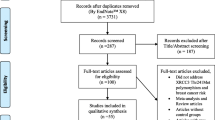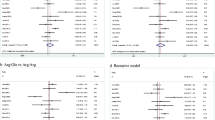Abstract
X-ray repair cross-complementing group 1 (XRCC1) plays a key role in the base excision repair pathway, as a scaffold protein that brings together proteins of the DNA repair complex. Several studies have reported contradictory results for XRCC1 exon 6 C>T (rs1799782) gene polymorphism and cancer risk in Indian population has provided inconsistent results. Therefore, we have performed this meta-analysis to evaluate the relationship between XRCC1 exon 6 C>T gene polymorphism and risk of cancer by published studies. We searched PubMed and Google scholar web databases to cover all studies published on association between XRCC1 exon 6 C>T gene polymorphism and cancer risk. The meta-analysis was carried out and pooled odds ratios (ORs) and 95% confidence intervals (95% CIs) were used to appraise the strength of association. In order to derive a more precise estimation of the association, A total of 3197 confirmed cancer cases and 3819 controls were included from eligible seventeen case-controls studies. Results from overall pooled analysis demonstrated suggested that that variant allele (T vs. C: OR 1.301, 95% CI 1.003–1.688, p = 0.047) was associated with the risk of overall cancer. Other genetic models; heterozygous (TC vs. CC: OR 1.108, 95% CI 0.827–1.485, p = 0.491), homozygous (TT vs. CC: OR 1.479, 95% CI 0.877–2.493, p = 0.142), dominant (TT+TC vs. CC: OR 1.228, 95% CI 0.899–1.677, p = 0.196) and recessive (TT vs. TC+CC: OR 1.436, 95% CI 0.970–2.125, p = 0.071) did not reveal statistical association. Publication bias observation was also considered and none was detected during the analysis. The present meta-analysis suggested that the variant allele T of XRCC1 exon 6 gene polymorphism was associated with the risk of cancer. It is therefore pertinent to confirm this finding in a large sample size to divulge the mechanism of this polymorphism and cancer risk in Indian population.






Similar content being viewed by others
References
Bray F, Ferlay J, Soerjomataram I, Siegel RL, Torre LA, Jemal A. Global cancer statistics 2018: GLOBOCAN estimates of incidence and mortality worldwide for 36 cancers in 185 countries. CA Cancer J Clin. 2018;68:394–424.
Takiar R, Nadayil D, Nandakumar A. Projections of number of cancer cases in India (2010–2020) by cancer groups. Asian Pac J Cancer Prev. 2010;11:1045–9.
Pharoah PD, Dunning AM, Ponder BA, Easton DF. Association studies for finding cancer-susceptibility genetic variants. Nat Rev Cancer. 2004;4:850–60.
Lichtenstein P, Holm NV, Verkasalo PK, Iliadou A, Kaprio J, Koskenvuo M, Pukkala E, Skytthe A, Hemminki K. Environmental and heritable factors in the causation of cancer-analyses of cohorts of twins from Sweden, Denmark, and Finland. N Engl J Med. 2000;343:78–85.
Friedberg EC. DNA damage and repair. Nature. 2003;421:436–40.
Bernstein C, Bernstein H, Payne CM, Garewal H. DNA repair/pro-apoptotic dual-role proteins in five major DNA repair pathways: fail-safe protection against carcinogenesis. Mutat Res. 2002;511:145–78.
Wood RD, Mitchell M, Sgouros J, Lindahl T. Human DNA repair genes. Science. 2001;291:1284–9.
Tudek B. Base excision repair modulation as a risk factor for human cancers. Mol Aspe Med. 2007;28:258–75.
Caldecott KW. XRCC1 and DNA strand break repair. DNA Repair (Amst). 2003;2:955–69.
Whitehouse CJ, Taylor RM, Thistlethwaite A, Zhang H, Karimi-Busheri F, Lasko DD, Weinfeld M, Caldecott KW. XRCC1 stimulates human polynucleotide kinase activity at damaged DNA termini and accelerates DNA single-strand break repair. Cell. 2001;104:107–17.
Caldecott KW, Aoufouchi S, Johnson P, Shall S. XRCC1 polypeptide interacts with DNA polymerase beta and possibly poly (ADP-ribose) polymerase, and DNA ligase III is a novel molecular ‘nick-sensor’ in vitro. Nucleic Acids Res. 1996;24:4387–94.
Kirschner K, Melton DW. Multiple roles of the ERCC1-XPF endonuclease in DNA repair and resistance to anticancer drugs. Anticancer Res. 2010;30:3223–322.
Shen MR, Jones IM, Mohrenweiser H. Nonconservative amino acid substitution variants exist at polymorphic frequency in DNA repair genes in healthy humans. Cancer Res. 1998;58:604–8.
Maqbool R, Amin S, Majeed S, Bhat A, Rasool SA, Nabi M. XRCC1 Arg194Trp polymorphism is no risk factor for skin cancer development in Kashmiri population. Egypt J Med Hum Genet. 2018;19:9–95.
Pavithra D, Gautam M, Rama R, Swaminathan R, Gopal G, Ramakrishnan AS, Rajkumar T. TGFβ C-509T, TGFβ T869C, XRCC1 Arg194Trp, IKBα C642T, IL4 C-590T genetic polymorphisms combined with socio-economic, lifestyle, diet factors and gastric cancer risk: a case control study in South Indian population. Cancer Epidemiol. 2018;53:21–6.
Konathala G, Mandarapu R, Godi S. Data on polymorphism of XRCC1 and cervical cancer risk from South India. Data Brief. 2016;10:11–3.
Devi KR, Ahmed J, Narain K, Mukherjee K, Majumdar G, Chenkual S, Zonunmawia JC. DNA repair mechanism gene, XRCC1A (Arg194Trp) but not XRCC3 (Thr241Met) polymorphism increased the risk of breast cancer in premenopausal females: a case-control study in northeastern region of India. Technol Cancer Res Treat. 2017;16:1150–9.
Singh A, Singh N, Behera D, Sharma S. Association and multiple interaction analysis among five XRCC1 polymorphic variants in modulating lung cancer risk in North Indian population. DNA Repair (Amst). 2016;47:30–41.
Ghosh S, Ghosh S, Bankura B, Saha ML, Maji S, Ghatak S, Pattanayak AK, Sadhukhan S, Guha M, Nachimuthu SK, Panda CK, Maity B, Das M. Association of DNA repair and xenobiotic pathway gene polymorphisms with genetic susceptibility to gastric cancer patients in West Bengal. India Tumour Biol. 2016;37:9139–49.
Bajpai D, Banerjee A, Pathak S, Thakur B, Jain SK, Singh N. Single nucleotide polymorphisms in the DNA repair genes in HPV-positive cervical cancer. Eur J Cancer Prev. 2016;25:224–31.
Annamaneni S, Gorre M, Kagita S, Addepalli K, Digumarti RR, Satti V, Battini MR. Association of XRCC1 gene polymorphisms with chronic myeloid leukemia in the population of Andhra Pradesh. India Hematol. 2013;18:163–8.
Kumar A, Pant MC, Singh HS, Khandelwal S. Associated risk of XRCC1 and XPD cross talk and life style factors in progression of head and neck cancer in north Indian population. Mutat Res. 2012;729:24–34.
Mittal RD, Mandal RK, Gangwar R. Base excision repair pathway genes polymorphism in prostate and bladder cancer risk in North Indian population. Mech Ageing Dev. 2012;133:127–32.
Srivastava A, Srivastava K, Pandey SN, Choudhuri G, Mittal B. Single-nucleotide polymorphisms of DNA repair genes OGG1 and XRCC1: association with gallbladder cancer in North Indian population. Ann Surg Oncol. 2009;16:1695–703.
Kiran M, Saxena R, Chawla YK, Kaur J. Polymorphism of DNA repair gene XRCC1 and hepatitis-related hepatocellular carcinoma risk in Indian population. Mol Cell Biochem. 2009;327:7–13.
Mitra AK, Singh N, Singh A, Garg VK, Agarwal A, Sharma M, Chaturvedi R, Rath SK. Association of polymorphisms in base excision repair genes with the risk of breast cancer: a case-control study in North Indian women. Oncol Res. 2008;17:127–35.
Pachouri SS, Sobti RC, Kaur P, Singh J. Contrasting impact of DNA repair gene XRCC1 polymorphisms Arg399Gln and Arg194Trp on the risk of lung cancer in the north-Indian population. DNA Cell Biol. 2007;26:186–91.
Ramachandran S, Ramadas K, Hariharan R, Rejnish Kumar R, Radhakrishna PM. Single nucleotide polymorphisms of DNA repair genes XRCC1 and XPD and its molecular mapping in Indian oral cancer. Oral Oncol. 2006;42:350–62.
Joseph T, Kusumakumary P, Chacko P, Abraham A, Pillai MR. DNA repair gene XRCC1 polymorphisms in childhood acute lymphoblastic leukemia. Cancer Lett. 2005;217:17–24.
Chacko P, Rajan B, Joseph T, Mathew BS, Pillai MR. Polymorphisms in DNA repair gene XRCC1 and increased genetic susceptibility to breast cancer. Breast Cancer Res Treat. 2005;89:15–211.
Woolf B. On estimating the relation between blood group and disease. Ann Hum Genet. 1955;19:251–3.
Wu R, Li B. A multiplicative-epistatic model for analyzing interspecific differences in outcrossing species. Biometrics. 1999;2:355–65.
Mantel N, Haenszel W. Statistical aspects of the analysis of data from retrospective studies of disease. J Natl Cancer Inst. 1959;4:719–48.
DerSimonian R, Laird N. Meta-analysis in clinical trials. Control Clin Trials. 1986;7:177–88.
Higgins JP, Thompson SG, Deeks JJ, Altman DG. Measuring inconsistency in meta-analyses. BMJ. 2003;327:557–60.
Begg CB, Mazumdar M. Operating characteristics of a rank correlation test for publication bias. Biometrics. 1994;50:1088–101.
Egger M, Davey Smith G, Schneider M, Minder C. Bias in meta- analysis detected by a simple, graphical test. BMJ. 1997;315:629–34.
Wallace SS, Murphy DL, Sweasy JB. Base excision repair and cancer. Cancer Lett. 2012;327:73–89.
Tebbes RS, Flannery ML, Meneses JJ, Hartmann A, Tucker JD, Thompson LH, Cleaver JE, Pedersen RA. Requirement for the Xrcc1 DNA base excision repair gene during early mouse development. Dev Biol. 1999;208:513–29.
Moore DJ, Taylor RM, Clements P, Caldecott KW. Mutation of a BRCT domain selectively disrupts DNA single-strand break repair in noncycling Chinese hamster ovary cells. Proc Natl Acad Sci USA. 2000;97:13649–54.
Lohmueller KE, Pearce CL, Pike M, Lander ES, Hirschhorn JN. Meta-analysis of genetic association studies supports a contribution of common variants to susceptibility to common disease. Nat Genet. 2003;33:177–82.
Mandal RK, Mittal RD. Genetic variant Arg399Gln G%3eA of XRCC1 DNA repair gene enhanced cancer risk among Indian population: evidence from meta-analysis and trial sequence analyses. Indian J Clin Biochem. 2018;33:262–72.
Tudek B. Base excision repair modulation as a risk factor for human cancers. Mol Asp Med. 2007;28:258–75.
Hanahan D, Weinberg RA. The hallmarks of cancer. Cell. 2000;100:57–70.
Munafò MR, Flint J. Meta-analysis of genetic association studies. Trends Genet. 2004;20:439–44.
Indian Genome Variation Consortium. Genetic landscape of the people of India: a canvas for disease gene exploration. J Genet. 2008;87:3–20.
Author information
Authors and Affiliations
Corresponding author
Ethics declarations
Conflict of interest
The authors declare that they have no conflict of interest.
Additional information
Publisher's Note
Springer Nature remains neutral with regard to jurisdictional claims in published maps and institutional affiliations.
Rights and permissions
About this article
Cite this article
Mandal, R.K., Mittal, R.D. Genetic Variant XRCC1 rs1799782 (C194T) and Risk of Cancer Susceptibility in Indian Population: A Meta-analysis of Case–Control Studies. Ind J Clin Biochem 36, 175–184 (2021). https://doi.org/10.1007/s12291-020-00877-7
Received:
Accepted:
Published:
Issue Date:
DOI: https://doi.org/10.1007/s12291-020-00877-7




